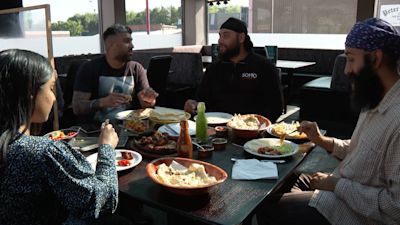The Birmingham pub initiative supporting south asian men’s mental health

ITV Central reporter Ravneet Nandra met up with the founders of Mixy & Chill to find out more about the initiative.
A new wellbeing support initiative for South Asian men facing mental health difficulties has launched in Birmingham, with an aim to normalise taboo conversations still prevalent in many south asian communities.
Three men have come together to use the site of a popular Indian gastro pub to launch the Mixy & Chill Movement, putting QR codes on their menus so people can easily access support and strike up a conversation in a familiar space over a curry.
Taraki, a mental health community organisation originating in Handsworth, Birmingham have partnered with Soho Tavern Group and Ricky Bhandal- a Substance Misuse Consultant and Podcast Host of Bhandwagon- to introduce the initiative.
It was triggered following a number of viral suicide cases discovered on social media of young male suicides in South Asian communities during the pandemic.
The Mixy & Chill Movement hopes to breakdown stigma, cultural barriers and discrimination to normalise conversations around mental health and change the narrative.
Ricky Bhandal said, "You'd hear about people in your age group or even younger having problems with mental health and we're kind of blessed in Birmingham to have a wide variety of mixed grill places.
He continued: "That environment has changed over the years now and they've become more family-orientated but it's also created a new kind of safer space to discuss things.
Their first movement is to use a QR code on the menus of Soho Tavern.
Restaurant-goers can scan the QR code and access an array of support services ranging from mental health, addiction, sexual health and LGBTQ+.
The initiative wants to use technology in a safe and comfortable space to create better connections between communities with existing health and wellbeing resources.
They say this would ensure that young men do not need to reach crisis point before they get help.
Shuranjeet Singh, the founder of Taraki said: "A lot of the mental discussions and wellbeing, health wellness discussions that are taking place, they're not happening where people are coming together already."
"We need to think where are the communities we want to support already meeting, where are they already feeling comfortable and how can we best support and uplift them in those places."
Mikey Singh of Soho Tavern Group said he owes it to his customers to give something back.
"Each individual businesses should have a moral conscience, especially when things are happening within the people that are funding them.
"Without these customers, we're nobody. We haven't got a business.
South asian mental health and the lack of research
Because of limitations in faith data collected, there is limited evidence to understand the true experiences of the south asian population when it comes to mental health.
For example, within the Sikh population, research from the Birmingham City Council Sikh Community Health Profile 2021 and British Sikh Report 2018 suggest a number of factors mental health is associated with, including:
feelings of loneliness and homesickness
isolation from their community
financial dependency on men
bringing up children without support from family networks
Research also suggests that mental illness is associated with shame and stigma.
The effects of mental ill health on lifestyle were highest among young Sikhs under the age of 19-years-old.
Racial harassment, expectations of hyper-masculinity and excessive drinking were classed as factors affecting mental ill health among Sikh men.
Arun Kapur struggled with his identity as a young adult and suffered with depression.
He say's he's glad there is change in the way we speak about mental health, but we're not there yet.
"I think it's something we should be able to speak about more openly, not for it to dominate our everyday lives, but for it to be a conversation without the sense of feeling like a burden or sense of awkwardness because these are just extensions of who we are.
"These are part of us as much as everything else.
Who to contact if you or someone you know needs help:
Samaritans operates a 24-hour service available every day of the year, by calling 116 123. If you prefer to write down how you’re feeling, or if you’re worried about being overheard on the phone, you can email Samaritans at jo@samaritans.org
Papyrus offers support for children and young people under the age of 35 over the phone on 0800 068 41 41 between 9am and midnight every day of the year. If you would rather text you can do so on 07786 209697 or send an email to pat@papyrus-uk.org
Mind also offers mental health support between 9am and 6pm, Monday to Friday. You can call them on 0300 123 3393 or text them on 86463. There is also lots of information available on their website.
Hector's House is a suicide and crisis prevention and help resource, with links to specialist helplines.